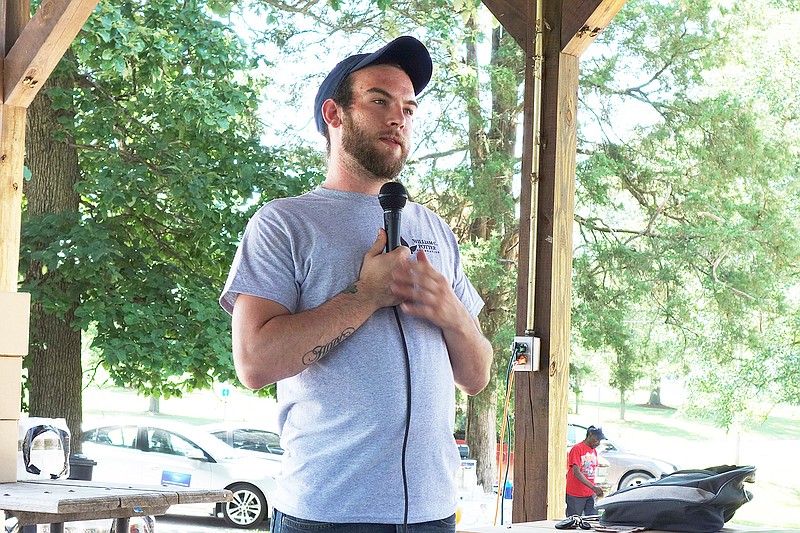Saturday's Hugs not Drugs event provided a stark look at substance use disorders - but also a message of hope.
"It always gets better, as long as you keep trying," Jasper Taylor said.
Taylor and his mother, Rachel Taylor, shared two sides of the same story Saturday. Taylor spent most of his teenage and young adult years addicted first to prescription painkillers and later to heroin.
"I lost my home, I could've lost my child easily, and I lost my life for six minutes," Taylor said.
Taylor was first prescribed painkillers when he underwent a series of surgeries in high school.
"After having so many surgeries and still being in pain, I started buying (painkillers)," he said. "It turned into using for fun. I was one of those kids parents wouldn't want their kids to hang out with."
His depression and trauma also played into the drug use, he said.
"Some people do (drugs) to try to erase bad memories," he said. "I don't really remember my teenage years."
After graduating from college, Taylor was what he described as a functional addict.
"I worked on water towers all over the country while using," he said.
At age 20, he had a young daughter and a new drug of choice: heroin.
"Before heroin, I was an attentive father," he sad. "Then I quit paying attention to my child."
That's when his downward slide accelerated. He lost his home and the trust of many family members. Rachel turned him away, too, fearing her home was becoming nothing more than a place for him to use drugs.
"There's nothing harder I've done than turn him away from my door," Rachel said. "It was 38 degrees and raining, and he was on foot walking back from Mokane to Fulton. I knew that could be the last time I saw him."
Taylor had heard negative things about rehab programs, so he tried to kick heroin on his own. He stayed sober for about five months, Rachel said.
"I was so proud of him," she said. "But when something went wrong, he went right back to it. And that's when he flatlined."
Taylor was clinically dead for six minutes. Someone performed CPR on him until paramedics arrived and administered Narcan, an overdose-reversing medication.
"They had to tell me what happened," Taylor said. "There's always that one moment that helps you change, and for me, that was it. It sucks that it wasn't the birth of my daughter."
Rachel finally persuaded Taylor to give rehab a try.
"There's a stigma around rehab," Taylor said. "People talk about it like it's jail. But for the first time, I was high on life. I had a great time.
Taylor made friends in rehab and slowly began reconnecting with his family. He moved out of Fulton and in with his mother to escape old places, people and habits.
"This is an illness, not a character flaw," Rachel said. "It's never going to go away. Any moment could be a trigger to send him right back where he was."
Connecting with event organizer April Ogden-DeTienne and the William C. Potter foundation helped Taylor find his voice and begin sharing his story.
He said he hopes to encourage others to seek help and start the process of recovering.
"If you can't do it for yourself, you can't do it for anyone else, either," he said.
Trafficking connection
Other speakers urged empathy and patience for those struggling with a substance use disorder.
"There is no healing where there's judging," said Nanette Ames of Central Missouri Stop Human Trafficking Coalition.
She said there's a clear connection between drugs and human trafficking; many criminals who traffic in one also traffic in the other. Ames cited a case in Carney where traffickers targeted women with drug addictions.
"Human traffickers target those who are vulnerable in a variety of ways," she said.
Traffickers use drugs to exert control over those they exploit, which makes it more difficult for a victim to escape trafficking. Aside from targeting those already having a substance use disorder, they may force drugs on a victim so they become dependent on their trafficker.
Drugs also become a way for victims to self-medicate, hiding the pain of what they're forced to do under a haze of drugs.
The most vulnerable are the most alone - homeless people or youths living on their own with no one watching out for them.
"We don't know who's in our neighborhood, who's on our street or who's right next to us and might be a victim or being groomed by a trafficker," Ames said.
She urged attendees to keep an eye out for those in need of help. The Human Trafficking Hotline is 888-373-7888.
To learn more about local resources that can help those with substance use disorders, reach out to the William C. Potter foundation via its Facebook page.

